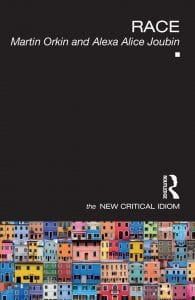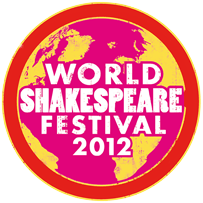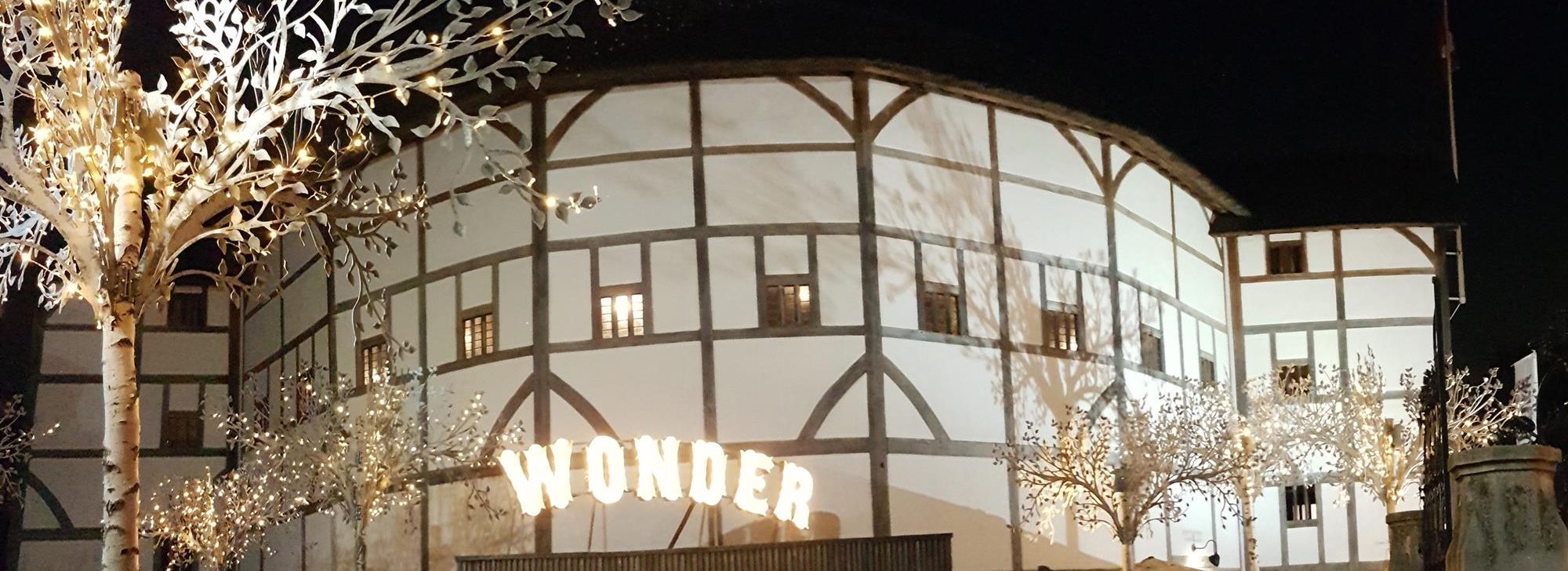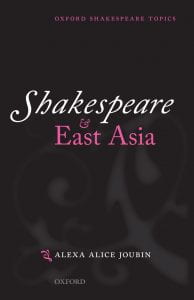 When AI goes to theater with humans, it changes the dynamics of the social space. This article examines a case of audiences using an AI app on their phones to translate a sign language performance. Whom does the screen interface serve, and how do artificial intelligence tools affect theatrical publics across both the playing space and the playgoing space? Screens are a site where cultural and performative meanings are generated and negotiated.
When AI goes to theater with humans, it changes the dynamics of the social space. This article examines a case of audiences using an AI app on their phones to translate a sign language performance. Whom does the screen interface serve, and how do artificial intelligence tools affect theatrical publics across both the playing space and the playgoing space? Screens are a site where cultural and performative meanings are generated and negotiated.
Category: Touring Theatre
Touring theatre and its impact
The Value of Global Shakespeare
Shakespeare and East Asia (2021) explores distinctive themes in post-1950s Asian-themed performances and adaptations of Shakespeare. In this Snapshot, former Fulbright Scholar Alexa Alice Joubin discusses the book and the importance of wider research into Global Shakespeares. ...continue reading "The Value of Global Shakespeare"
Ethics of Performative Citations of Shakespeare
 Global Shakespeare can be studied through two interrelated concepts: performance as an act of citation and the ethics of citation. Appropriating the classics carries strong ethical implications. A crucial, ethical component of appropriation is one’s willingness to listen to and be subjected to the demands of others. These metaphorical citations create moments of self and mutual recognition. Seeing the others within is the first step toward seeing oneself in others’ eyes. The act of citation is founded upon the premise of one’s subjectivity, the subject who speaks, and the other’s voice that one is channeling, misrepresenting, or appropriating. ...continue reading "Ethics of Performative Citations of Shakespeare"
Global Shakespeare can be studied through two interrelated concepts: performance as an act of citation and the ethics of citation. Appropriating the classics carries strong ethical implications. A crucial, ethical component of appropriation is one’s willingness to listen to and be subjected to the demands of others. These metaphorical citations create moments of self and mutual recognition. Seeing the others within is the first step toward seeing oneself in others’ eyes. The act of citation is founded upon the premise of one’s subjectivity, the subject who speaks, and the other’s voice that one is channeling, misrepresenting, or appropriating. ...continue reading "Ethics of Performative Citations of Shakespeare"
Race and the Epistemologies of Otherness
 Excerpted from chapter 5 of Race by Martin Orkin and Alexa Alice Joubin. New Critical idiom Sereis. London: Routledge, 2019, pp. 193-227. Full text available online
Excerpted from chapter 5 of Race by Martin Orkin and Alexa Alice Joubin. New Critical idiom Sereis. London: Routledge, 2019, pp. 193-227. Full text available online
When confronted with the unknown, many societies tend to transfer observations of unfamiliar phenomena onto their mental map of what is already known. Race as a category is entangled with empirical knowledge, misinformation, and ideology, all of which seek to justify and sustain particular beliefs. Knowledge about otherness is socially constructed. Knowledge of race results from taxonomical observations made for colonial, medical, bureaucratic, or other purposes such as political movements. ...continue reading "Race and the Epistemologies of Otherness"
Local and Global Myths in Shakespearean Performance
Local and Global Myths in Shakespearean Performance
Edited by Aneta Mancewicz and Alexa Alice Joubin
In the Reproducing Shakespeare series (ed. Tom Cartelli and Katherine Rowe)
Palgrave Macmillan, 2018
“Contradictory myths are the foundation to many conversations about Shakespeare today. We can better grasp the significance of globalShakespeare by understanding the cultural logic of the production and consumption of these myths—often articulated in the form of journalistic adoration of universal aesthetics.”
Full text of the Introduction: researchgate.net/profile/Alexa_Joubin
...continue reading "Local and Global Myths in Shakespearean Performance"
“To unpath’d waters, undream’d shores”: Shakespeare in the World
"Voodoo" Macbeth? Heir apparent of the Denmark Corporation in Manhattan (Hamlet 2000)? A pair of star-crossed lovers from feuding families who own competing food stalls in Singapore (Chicken Rice War). In the centuries since William Shakespeare's death, numerous stage and, more recently, film and television adaptations of his work have emerged to inspire, comfort, and provoke audiences in far-flung corners of the globe. As early as 1619, for example, Hamlet was performed in colonial Indonesia to entertain European expatriates. In 1845, U.S. Army officers staged Othello in Corpus Christi, Texas, as a distraction from the run-up to the Mexican-American War. Supported by the National Endowment for the Arts, the Alabama Shakespeare Festival toured its production of Macbeth to several key U.S. military bases in 2004. ...continue reading "“To unpath’d waters, undream’d shores”: Shakespeare in the World"
Global Shakespeare Criticism beyond the Nation-State
 On a sunny afternoon in early June, 2015, in a rehearsal room at the University of Warwick, director Tim Supple was rehearsing a globally envisioned King Lear with a group of talented actors from Ukraine, France, Nigeria, South Korea, India, and other parts of the world. When the actress Hong Hye Yeon playing Kent lamented in an aside in act 1 scene 4 that ‘[i]f but as well I other accents borrow, / That can my speech defuse’ in Korean (commenting on her and Kent’s disguise as part of the character’s effort to serve and assist Lear), the Ukrainian Lear (Oksana) responded powerfully in Russian. The cross-cultural dialogue was rich and beautifully embodied by the actors, their choice of modern editions or translations of the play, and their individual acting styles. The entire multinational cast was cooking up something delicious and original.
On a sunny afternoon in early June, 2015, in a rehearsal room at the University of Warwick, director Tim Supple was rehearsing a globally envisioned King Lear with a group of talented actors from Ukraine, France, Nigeria, South Korea, India, and other parts of the world. When the actress Hong Hye Yeon playing Kent lamented in an aside in act 1 scene 4 that ‘[i]f but as well I other accents borrow, / That can my speech defuse’ in Korean (commenting on her and Kent’s disguise as part of the character’s effort to serve and assist Lear), the Ukrainian Lear (Oksana) responded powerfully in Russian. The cross-cultural dialogue was rich and beautifully embodied by the actors, their choice of modern editions or translations of the play, and their individual acting styles. The entire multinational cast was cooking up something delicious and original.
During the brainstorming session that followed, Supple asked: ‘What came before language?’ The question was designed to draw attention to multilingual spaces on and off stage and the implications of acting and doing Shakespeare in such a space. He asked the group to take note of what we might find ‘when we move away from [verbal] language’ and of the ‘seeds of what we might find’. The answers the group came up with were diverse and rich: emotions; physicality; body language; that which incarnates the words; what lies under the words; and, last but not least, clarity of intent. In other words, there is a rich non-verbal language that come before and alongside utterance, which is particularly true in the case of non-English-language or multilingual performances of Shakespeare. ...continue reading "Global Shakespeare Criticism beyond the Nation-State"
“Shakespeare and Censorship,” Hay Festival, 2016
...continue reading "“Shakespeare and Censorship,” Hay Festival, 2016"
London Flooded
My research on Shakespeare and intercultural global performances took me to London, where I was working on a book on how diasporic artists approach Shakespeare and how their works are received. One day, I rented a bike and rode along the Thames. One section was flooded due to high tide, and I rode with the ducks.
This section of beautiful Chelsea seems to be flooded often during high tide of the Thames. Ducks swam on the street.
Boomerang Shakespeare: Foreign Shakespeare in Britain

Shakespeare has become a boomerang business in the twenty-first century—a phenomenon that is fueled simultaneously by globalized local economic and cultural developments. His plays have been traveling the world since his lifetime and now returned to Britain with many different hats, making the familiar strange and bringing home the exotic. U.K. tours have come to define some of the most memorable productions today, and international collaborations have inspired artists in Britain and elsewhere. Boomerang Shakespeare encompasses a range of events, including non-Anglophone productions, co-productions by British and foreign artists, local events celebrating Shakespeare’s global afterlife, and British productions that incorporate elements from more than one culture in its cast, style, or set.
================================
"Boomerang Shakespeare: Foreign Shakespeare in Britain." The Cambridge Guide to the Worlds of Shakespeare Vol. 2: The World's Shakespeare, 1660-Present, ed. Bruce Smith (Cambridge: Cambridge University Press, 2016), pp. 1094-1101. Open-access full text available
================================
How to cite this article:
Alexa Alice Joubin, "Boomerang Shakespeare: Foreign Shakespeare in Britain," Shakespeare on the Move, https://blogs.gwu.edu/ajoubin





